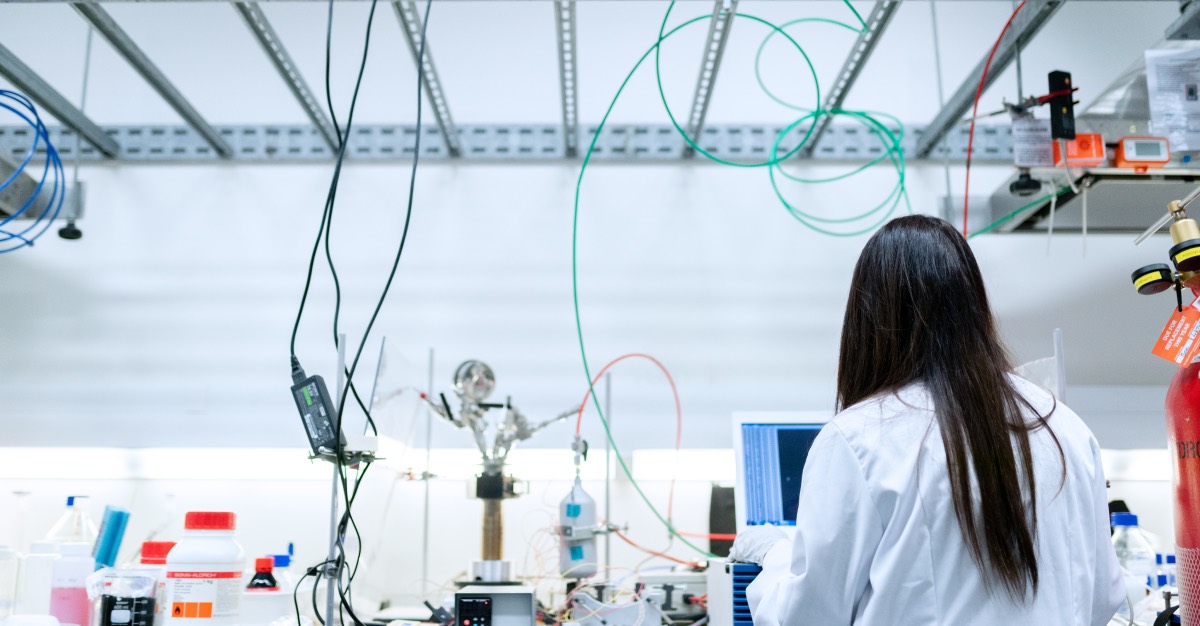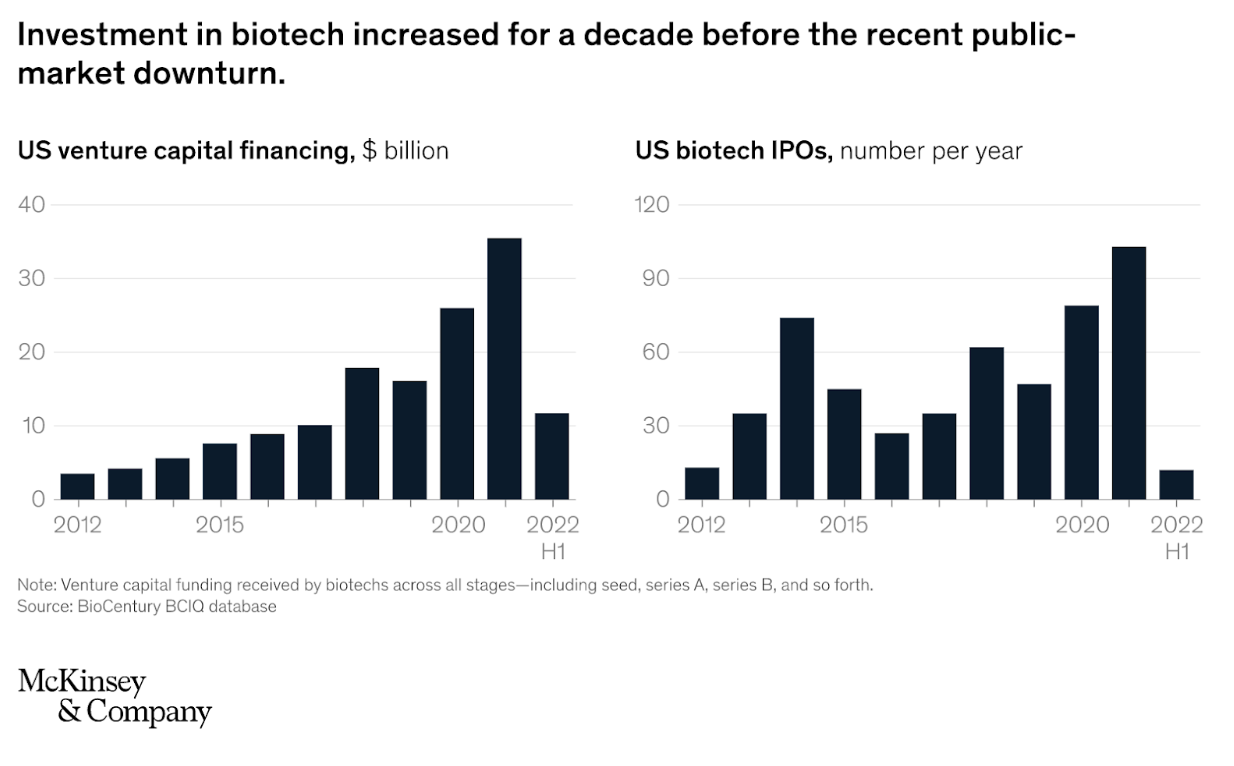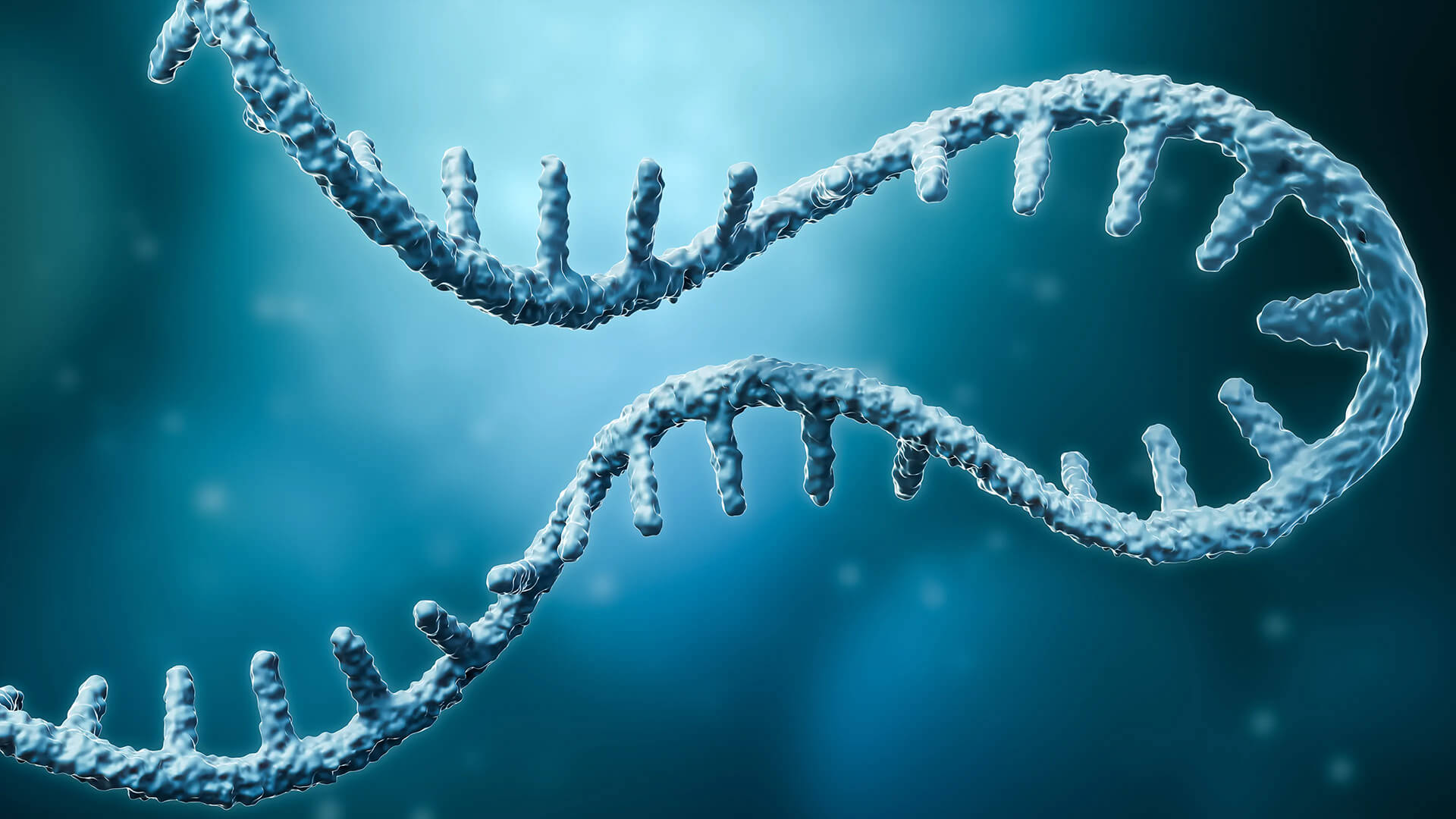What’s in store for biotech in 2023? 4 trends from an industry expert

The US biotech industry prospered over the last decade, with venture funding expanding, healthy public debuts, and world-changing breakthrough innovations. Now, after a decade of plenty, the biotech sector is faced with a challenging market, and is being asked to do more with less. How will this shape biotech’s pipelines, R&D strategies, and teams?
Benchling Cofounder and President Ashu Singhal shared his views on some of the trends we can expect in 2023 — from innovations in biomanufacturing, to AI helping to scale efficiency in research, and beyond. Read on for his predictions.

Source: McKinsey, Sept. 2022
1. Biomanufacturing, not just biology research, will become the focus of innovation
The Biden bioeconomy executive order put a big focus on increasing national biomanufacturing capacity. The need is urgent: Today’s reality is that many patients are unable to access everything from basic treatments for the flu to complex cures for diseases like cancer because of limitations in biomanufacturing.
With CAR-T therapy for multiple myeloma as an example, the median wait time for a treatment slot is 7 months, during which time the cancer can progress to a point where CAR T-cell therapy will no longer be beneficial. 25% of patients die waiting for a slot. Biomanufacturing is a major bottleneck here. There aren’t enough CAR-T manufacturing facilities and the process of manufacturing these bespoke treatments, which rely on patients’ unique cells, is often entirely manual. Manufacturing sites rely on paper and pen to capture all the manufacturing data, not only does this slow things down, it also introduces a higher potential for error compared to digital systems.
If the record keeping can be made entirely electronic and easily shared across all the stakeholders in the manufacturing process, like the hospital, shippers, and drugmakers, CAR-T cells could be made an estimated 40% faster. Innovative biotechs are starting to address this problem: Ori Biotech is an example of a company focused on the industrialization of precision medicine like CAR-T, creating a fully digital platform that connects R&D to manufacturing. I’m also seeing pharmas improving the vein-to-vein time by automating these processes. Industry leaders Kite Pharma, Novartis, and Bristol-Myers Squibb have built digital platforms for CAR-T production.
2. Tech workers leave big tech for biotech and don’t look back.
More than 150,000 workers globally have recently left tech and are looking for the next opportunity. They’re seeking more meaning, more impact, and a bigger challenge.
Biotech is the next big thing. Not crypto, not the metaverse. Technologists are waking up to the fact that biotech offers the most interesting data and software challenges of this century. They want to work on groundbreaking innovations with potential for real-world impact, and biotech is an industry that’s curing disease, combating climate change, and eliminating hunger.
It’s also an industry where technologists have recently made massive contributions, whether it’s getting COVID vaccines to market faster or making unprecedented advancements in predictive AI, like Chroma from Generate Biomedicines. And this is just the beginning. Tech’s superpower is in making complex systems simple, accessible, and scalable. Tech workers have spent decades transforming industries with a cloud-first, digital, and data-driven approach. Now, they’re leaving tech for tech’s sake and applying their lessons learned to the R&D lab.
Tech workers have the skills that biotech needs today. Biotech will build on this moment and ramp up hiring of data scientists, ML experts, and software engineers.
3. AI has unintended consequences on biotech, and that’s a good thing.
The biotech industry is starting to see real progress with AI-focused drug discovery companies reaching meaningful milestones or readouts of clinical trials – Relay Therapeutics and Recursion are two examples. These successful readouts are catalyzing more investment into the space. Big pharma has done $20B of AI-based drug discovery deal-making in the last 12 months alone, spending hundreds of millions upfront. This is also driving more partnerships between pharma and AI players, with 67 partnerships in 2021, a 3x increase in the last three years.
For an industry that has historically prized lone discovery or collaboration around a single molecule, AI is creating a lot of collaboration and partnership surface area in biotech, and it's also requiring labs to collaborate on massive data sets.
To set up for success with AI, biotech needs:
In-house talent: The industry is already heading in this direction and is in full-on AI recruitment mode, with a steady state of around 1,500-2,000 AI job openings across large pharma.
Data backbone: Biotech organizations need to start with a solid data and digital infrastructure to enable their AI ambitions. Universal access to high-quality data at-scale is the cornerstone to a successful AI and ML strategy.
AI in biotech will be a forcing function for biotechs to accelerate hiring of data scientists and AI and ML roles, and to create better data standardization and stronger digital data backbones. These changes will not only benefit the application of AI and ML in biotech, but will lead to improvements in scalability and efficiency in R&D in general.
4. ‘Made with bio’ is embraced by consumers.
The fact that we all received mRNA vaccines, and we didn’t even know what mRNA was two years ago, is a big shift. Covid drove a step function change in society’s comfort level with having more things in our daily lives made from cells and biological means. We’re better primed for biotech today, and the industry will parlay that to its advantage in garnering more support for ‘made with bio’ products.
We’ll see this play out in food innovation in particular. According to the UN Food and Agriculture Organization, global agricultural output must increase 28% over the next decade to achieve food security — more than triple the increase in productivity over the last decade. Modern science offers tangible hope here, developing drought-tolerant crops, more nutritious foods, replacing chemicals with biodegradable enzymes in home products.
I believe we’ll see the first cell cultured food product approved by F.D.A. for U.S. consumers in 2023. Consumer appetite for such advancements will only increase, as motivated by pressing environmental demands and increased consumer comfort with biologically-produced products.
2023 Biotech Digital Transformation Assessment
Are you falling behind when it comes to digitizing your lab? We've worked with top biotech companies and surveyed nearly 1,000 scientists on their digital efforts. Take our assessment to see how you measure up.
Powering breakthroughs for over 1,300 biotechnology companies, from startups to Fortune 500s

